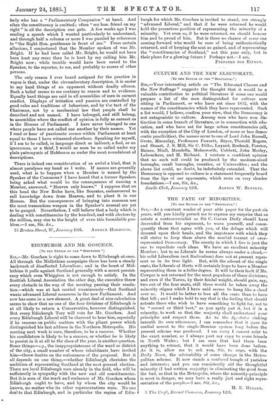EDINBURGH AND MR. GOSCHEN. [To THE EDITOR OF THE "SPECTATOR
-] Goschen is right to come down to Edinburgh at once. All through the Midlothian campaigns there has been a steady backwash of disaffected Liberalism ; and in the heart of Midlothian it pulls against Scotland generally with a secret persistency which even Whiggism is not enough to satisfy. In the Scottish Liberal Association the other day, the executive threw every obstacle in the way of the meeting passing their resolution—which was at last carried unanimously—that Scotland wants advanced Liberal measures in the new Parliament. And now has come in a new element. A great deal of nice calculation seems to show that no one of the four divisions of Edinburgh is at all likely to return a Conservative, however distinguished. But every Edinburgh Tory will vote for Mr. Goschen. And every Edinburgh Liberal will be charmed to hear him, especially if he reasons on public matters with the pliant power which distinguished his last address in the Northern Metropolis. His meeting next week is sure, therefore, to be a success. Whether his candidature is likely to be a success, or whether he is likely to persist in it at all to the close of the year, is another question. Some things—e.g., the inappropriateness of the ward or district of the city, a small number of whose inhabitants. have invited him—throw doubts on the seriousness of the proposal. But it all depends on one thing,—whether Edinburgh cherishes the ambition of representing Scotland at the next general election. There are local Edinburgh men already in the field, who will be sufficiently in sympathy with the new and old constituencies. But it is men of the mark and eminence of M. Goschen whom Edinburgh ought to have, and by whom the city would be known, no matter who its other representatives were. No one doubts that Edinburgh, and in particular the region of Edin
burgh for which Mr. Goschen is invited to stand, are strongly "advanced Liberal," and that if he were returned he would hold the precarious position of representing the minority of a minority. Yet even so, if he were returned, we should honour him and be proud of him. But is there no chance of some one coming forward who would be sure of being enthusiastically returned, and of keeping the seat so gained, and of representing the "constituencies of Scotland," not this year only, but in their plans for a glowing future ? Perhaps not.—I am, PREPIRED FOR EITHER.






































 Previous page
Previous page